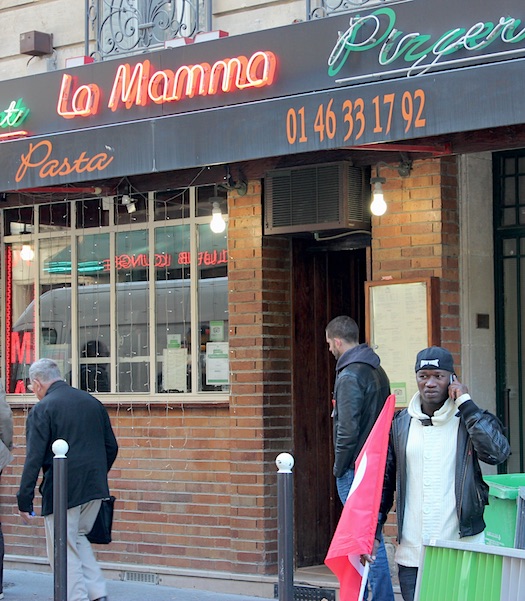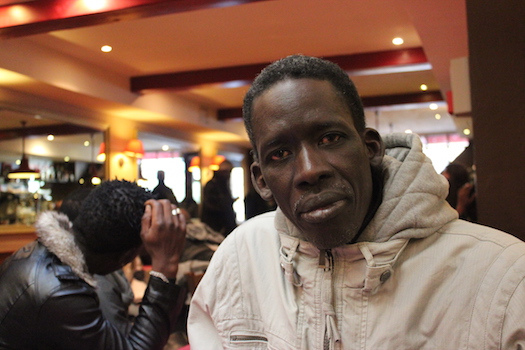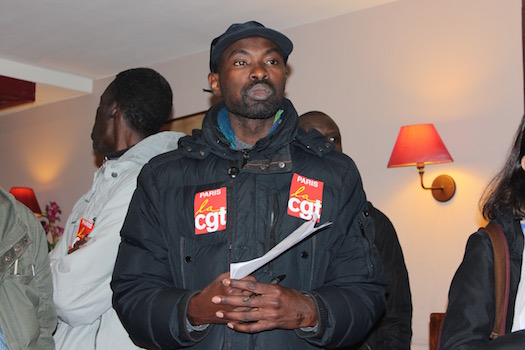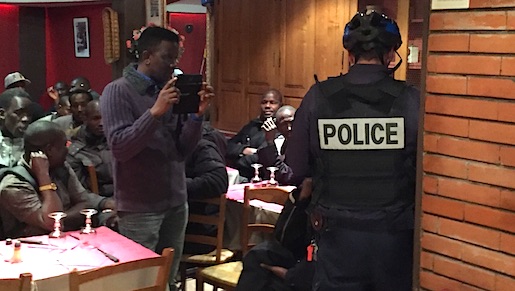Undocumented workers raise their voices
Arbetet Global was present when a group of undocumented workers occupied the La Mamma restaurant in Paris, France. They were fighting for their friends’ right to legal employment.
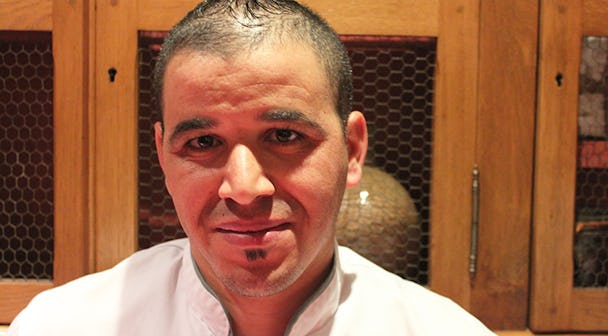
This is a translated version of an article first published in Swedish, in October 2015. You could find the original Swedish article her.
It´s just like any another Thursday in central Paris.
Everything is normal.
People are sitting outside restaurants enjoying a meal in the sun. Others are strolling outside the Métro station Vavin near the Montparnesse Tower.
Then – just after eleven o’clock – everything changes.
Suddenly the street fills with people. They gather. Shake hands. A red flag is unfurled and someone holds it, raised above their heads. Others put stickers on their jackets.
At least 70 people have gathered outside the Métro station. After a few minutes, they start to walk along the boulevard. They turn up Rue Vavin, and after a short walk they come to an Italian restaurant – La Mamma.
According to Christine Kermoal, a redheaded trade union activist from CGT, there are five undocumented workers at the restaurant.
– We are here to help them to get a legal employment contract.
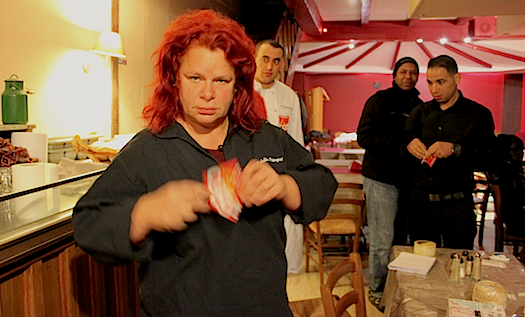
Christine Kermoal, from the French trade union CGT, puts a sticker on just after the occupation has begun. Photo: Erik Larsson
The whole group goes inside. Filling the restaurant with undocumented workers who want to help their friends, mostly young men from Senegal.
One man leans two flags against a chair. Another puts a banner on the wall.
A tall man walks around the restaurant and introduces himself as “Ibrahima”. He is one of the organisers. Soon the owner of the restaurant arrives, Madame Soheila Mohebbi.
An intense discussion starts between owner and trade unionists. The undocumented workers sit quietly at the tables and listen to what seems to have become negotiations. Suddenly Madame Soheila Mohebbi takes her telephone and retreats behind the bar.
Concerned voices are raised.
– She is calling the lawyer, someone says.
– Or the Police, another responds.
When she returns, the intense discussion continues. Again Madame Soheila Mohebbi leaves but returns a couple of minutes later with a thick binder.
She points at it the figures on its pages:
– Look, they have only worked 15 hours a week, she says.
– That´s not true, they have worked 45-50 hours a week, a trade unionist says.
The two chefs, Chaibi Aymen and Miladi Aymen from Tunisia, are there as well but remain in a slightly darker corner of the room. It is their working hours that is being discussed.
*
There was a time when undocumented workers in France dare not challenge their employers.
The risks were too grave. The risk to lose their job. The risk to get deported.
The turning point came in 2006, with a strike at the laundry Modeluxe Industrial in Essone, south of Paris. Twenty employees (from West Sahara) demanded proper employment contracts.
In France, being able to validate one full year of employment can result in being awarded a national working permit.
There was large-scale media coverage as the strike grew to include all the 160 employees. The eventual victory for the strikers lit a candle in an ocean of darkness for the undocumented workers of France.
This unprecedented development was followed by a wave of occupations of work places, of strikes and of other labor conflicts. The undocumented workers refused to remain quiet, demanding legal contracts in their efforts to become legal employees.
Yet these changes were concurrent with a tougher approach from the authorities towards migrants.
Pushed by Interior Minister Sarkozy, the government ordered the Police to increase the controls of migrant identity documents, partly in order to find and deport a quota of 27 000 migrants. This move included a ban on hiding undocumented migrants.
But these undocumented migrant workers were striking, seemingly without regard for the stricter measures. How was this possible?
The author and filmmaker Lucie Tourette, has for several years been covering the situation of undocumented workers. She offers an explanation that sets migration legislation against the laws of the labour market.
– During a strike, the Police can arrest anyone who is not permitted to be in the country, but also, according to the law, everybody has the legal right to strike.
But there is yet another reason. A trade unionist at CGT describes the practical issues of the work migrants do.
– It would be very easy for the Police to arrest many illegal migrants. They could just stop a communter train to Paris at six in the morning. They are filled with undocumented workers. But if the Police did that…there would be chaos in the city…
*
Sirens are heard. Eyes glance at the door. It was now just after twelve. The doors open suddenly and several policemen enter.
Madame Soheila Mohebbi stands behind the bar. She points at her binder and explains
– I didn´t know that they didn´t have work permits. They said they did, all of them.
It is important for her to make that claim.
The EU directive (Employer Sanction Directive) of 2011 states that employers need to make sure that their workers are allowed to be in the country. If they don´t, they might be fined.
The trade unionist from CGT argues against the owner, saying that some workers have been at the restaurant for eleven years and have been working for forty-five to fifty hours per week.
Riaw Yagja is sitting on a chair close to the wall, listening to the discussion.
-I came to France three years ago, from Senegal. Right now, I don´t have any work. It´s very tough to find something.
The French economy is in bad shape and unemployment is eleven percent.
The Police make a final inspection inside the restaurant.
“Another strike” they seem to think. Then they leave, closing the door behind them.
*
It´s just after three o’clock. The activists are now occupants of the restaurant. Some sit around a table talking, others are sit quietly, alone.
Ibrahima walks around, talking to different people. He has a paper in his hand. A role call starts.
Name after name is heard. Hands in the air. Some questions arise. Which persons are going to stay during the night? A list is written.
– This could take a long time, says Christin Kermoal.
Her eyes are tired, but her hair still shines red. After compiling the list, some of the occupants leave the restaurant.
Samble introduces himself. He is 31 years old and has been living in France for two years. He has the same problem as many others at the restaurant.
On one day he may work, making some money, but the next day there is no work and no money. Sometimes he cleans houses, other times he works on constructions sites. The salary is around 60 euro a day.
– No work – no life.
Like many others, he paid smugglers to take him over the Mediterranean Sea, travelling from Morocco to Spain. Samble is one of the few in the restaurant who want to talk about his boat trip.
– One person in the boat died, he says after a while.
– He was young, only a child. I remember he stood up in the boat…and suddenly he was in the water. But we just kept going.
One of the five employees whose situation is being brought out into the light, chef Chaibi Aymen from Tunisia, just says “the boat trip…it was awful”. His eyes fill with tears. In 2011, the same year as the Jasmine spring, Chaibi Aymen paid 1000 euro to smugglers how promised him a passage to Lampedusa, Italy.
It´s five o’clock and a large plate of rice and chicken is served.
Senegalese food. Tiny grains of rice. Foil with chili paste is put on the table.
Outside, darkness gathers.
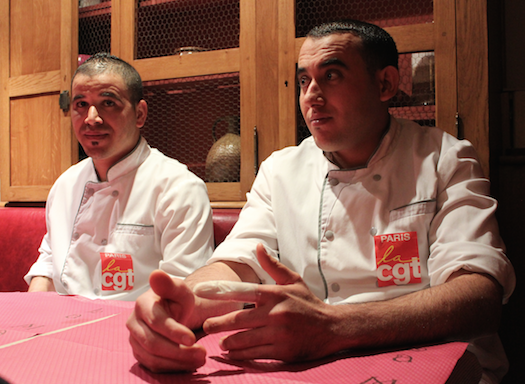
Chaibi Aymen and Miladi Aymen from Tunisia. They paid 1000 euro each for the boat trip to Europe. Photo: Erik Larsson
*
The xenophobic political party Front National hopes to win the French presidential election in 2017.
At the moment, according to several polls, it has the largest support of all parties.
The leader of the party, Marine Le Pen, has done everything she can to remove the stamp as a xenophobic party.
Last month she forced out the founder of the party – her father Jean Marie Le Pen – after he had called the Nazi gas chambers a historical detail.
At La Mamma, the occupants do not have so much to say about The National Front.
– Most of the French people are good. There are racists, but there are also others.
But according to the statistics, the consequences of xenophobia are causing a growing problem. Between 2012 and 2014 ‘hate crimes’ have increased by 53 percent. After the terrorist attack of the Charlie Hebdo magazine, at least 153 ‘hate crimes’ have been registered.
Yet this is not particular for France. According to the EU-commission, the xenophobic and anti-Semitic movement is growing in Europe.
*
The doors open. It is now past eight in the evening.
A policeman walks in. He wants the occupants to remove the flags outside, “just over night”.
Half an hour later, it is time for a change as the night shift arrives.
Ibrahima and Christine Kermoal enter. Ibrahima looks fit. He talks to everybody and starts to make plans. Which journalist is to be informed. Which activist should we call if the Police come.
Outside on Rue Vavin, the red neon signs glitter and the night falls.
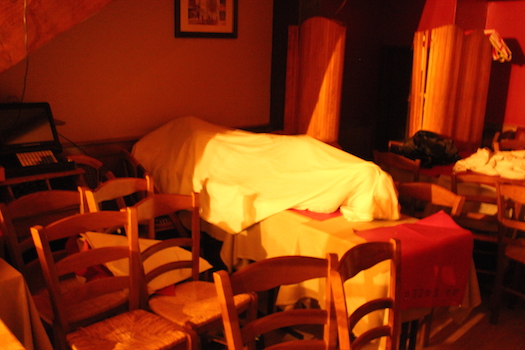
Sow Thierno from Senegal is spending the night sleeping on some tables in the restaurant. Photo: Erik Larsson
*
It´s seven in the morning. A new day is dawning. The windows are pierced by the first rays of light.
Inside the restaurant it´s still pitch dark. The tables, pushed together, are used as beds. Someone turns on the light. 18 people spent the night in the room.
One by one they take turns in the bathroom to wash the night away and change underwear.
Ibrahima is looking tired, and so is Christine Kermoal.
She goes out, feels the cold morning breeze, stands on the pavement and lights a cigarette.
– You don´t sleep very well in there.
This is the second occupation in which she is taking part. The last one was at a hairdresser franschise – Da las afro beauty. The trade union demanded that 18 workers should get their work permits. After a ten-month struggle, they succeeded.
– This could also take a long time but we will never give up.
Footnote: One month after this article was published the restaurant did agree to make a deal with the union and the workers got their work permits, read more about it (swedish).
